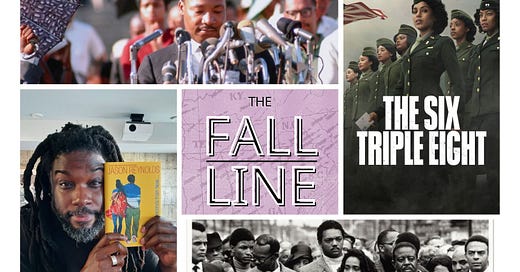What do you ~really~ know about the MLK assassination? (Issue #87)
An exploration of a shockingly under-told story.
Hi friends!
No doubt – it’s been a rough news week. With everything swirling, I want to pause and focus on someone whose legacy remains as crucial today as ever: Dr. Martin Luther King, Jr.
This past Monday was an unfortunate double-header of MLK Day and the inauguration. I’m not the first person to highlight the irony in this. Still, that juxtaposition got me thinking about how we remember King, especially in the sanitized way his legacy is often presented.
For years, I’ve wrestled with how MLK Day is used to package a radical, complex figure into something palatable. Last year, I wrote about this in-depth, but this year I’ve been mulling over new aspects of King’s legacy.
A few months ago, someone suggested I cover King’s assassination for my podcast Truer Crime. And while this case is one of the most infamous assassinations in US history, I was struck by just how little I knew. So, I dove in—and what I uncovered completely reshaped my understanding of his death—and the forces behind it.
On the last full day of his life, Martin Luther King spent his morning nervously pressed into a narrow airplane seat bound for Memphis. When I first learned this fact, it struck me—not for its novelty but for its ordinariness. There’s something about being strapped inside an 80,000-pound steel bird careening through the sky that seems to level the playing field. At 30,000 feet, even the body of a civil rights icon can feel frustratingly fragile.
What’s less relatable, though, is the gnawing sense of dread that comes with a deeper knowing: ‘If this plane were to go down, it’d be because you were on it.’
Before takeoff, King’s flight had been delayed—not for maintenance or weather—but because a bomb threat targeting him needed vetting. King and the other passengers waited while dogs sniffed through the aisles. When the all clear came, the flight was re-boarded, and they touched down in Memphis a single hour later than planned.
For King, it was just another morning, the dread looming over him had grown larger in the months leading up to this day. From that very first bus boycott in Montgomery, Alabama, more than a decade earlier, King had been a target. But as he expanded his mission from civil rights to economic justice and anti-Vietnam war advocacy, he alienated allies and enraged powerful enemies. The threats against him? They’d only grown louder.
Still, as King stepped off that plane in Memphis, he knew he had a job to do. He’d come to support striking garbage workers in their quest to form a union.
That evening he stood before a crowd of 2,000 and delivered his soon-to-be-famous “Mountaintop” speech. His voice crescendoed powerfully as he reached its prophetic conclusion:
“I may not get there with you, but I want you to know tonight that we as a people will get to the promised land. So I'm happy tonight. I'm not worried about anything. I’m not fearing any man. Mine eyes have seen the glory of the coming of the Lord.”
At 30,000 feet—or right here on the ground—the body of a civil rights icon can feel frustratingly fragile.
The next day, at 6 PM, King stepped out onto the balcony of his room at the Lorraine Motel. Looking over the railing’s edge, he spotted Ben Branch, a talented saxophone player set to play at a celebration for the striking workers later that evening.
“Ben,” King called out, “play "Precious Lord"... tonight. Play it real pretty.”
It was his favorite hymn. But he’d never hear it again.
A loud cracking noise, a single bullet, and that was it. Dr. Martin Luther King Jr., was dead.
What happened next is a story you might know, a tale repeated on television, across headlines, and in history books – the pursuit of King’s killer began immediately. Before long, police would find a rifle out on the street, next to it a bag filled with a strange assortment of items: binoculars, nine bullets, a radio, a pair of pliers, a few beers, and a copy of that day's newspaper.
As the story goes, fingerprints on the gun matched a man named James Earl Ray, a fugitive who’d escaped prison and been on the run for a year. Investigators learned that Ray had rented a room in a nearby boarding house, one that gave him access to a bathroom with a clear line of sight to King’s balcony.
Finally, after months on the run, Ray was captured at an airport in London. He plead guilty to King’s murder and was sentenced to 99 years in the state penitentiary.
So…case closed, right?
Well, not quite.
Because in 1997—nearly 30 years later, Dr. King’s son, Dexter King, met with James Earl Ray in prison. And that meeting? It left me wondering: if you could stand face to face with the person who took your father’s life, what would you ask?
Dexter King had one question in particular.
“Did you kill my father?” he asked.
“No,” Ray said. “No, I didn't, no.”
Dexter King replied, “I want you to know that I believe you, my family believes you, and we are going to do everything in our power to try and make sure that justice will prevail.”
Well, now I was hooked. Because if James Earl Ray didn't kill King? Who did?
Well, you can find out by listening to this week’s episode of Truer Crime. It’s a case filled with twists, unanswered questions, and revelations that demand attention. From King’s prophetic final hours to an overlooked civil trial implicating the U.S. government, the real story reveals far more than our history books taught us.
You can listen to “The Assassination of Dr. Martin Luther King Jr.” on Spotify, Apple Podcasts, or by searching “Truer Crime” wherever you get your podcasts.
A round-up of things to watch, read, and listen to as you head into the weekend.
Podcast: The Fall Line
Hosted by writer and former academic Laurah Norton, this podcast dives into the world of cold cases. Each episode approaches its subject matter with care and nuance—often involving victim’s families and departments directly connected to the case. As a bonus, Laurah had me on the show last week, where I shared a few behind-the-scenes tidbits of cases we’ll be covering in Truer Crime season 2. Listen on Spotify, Apple Podcasts, or wherever you get your podcasts.
The New Yorker: The Haunted Juror by Jennifer Gonnerman
Nearly 30 years ago, Luana Mango Dunn sat on a jury that sent two teenagers to prison for murder. Then, in 2024, she learned the two men had been exonerated. This article is a fascinating portrait of wrongful conviction and its long-reaching impacts.
Netflix: The Six Triple Eight
This Tyler Perry-directed movie, starring Kerry Washington, Ebony Obsidian, Sarah Jeffrey, and Oprah Winfrey, was a good watch! It tells the true story of the U.S. Army's 6888th Central Postal Directory Battalion, the first and only Women's Army Corps unit of color stationed in Europe during World War II.
Things to try + share in the group chat.
Note: Links preceded by an asterisk (*) are affiliate links that allow me to collect a small commission when you purchase something I’ve recommended. That said, I can promise I’ll only ever share items I love. Buying through these links is one way to support me and my small biz. ❤️
Have you heard of glimmers? In the simplest of terms, glimmers are the opposite of triggers. Developing a habit of noticing and practicing gratitude for these moments of joy can really transform your mental health for the better. This swipe graphic introduced me to the concept a few weeks ago:
Jason Reynolds is a new-to-me author, but the Instagram reel he made pitching the concept for his new book *Twenty-Four Seconds from Now . . .: A Love Story really sold me! Check it out:
Last week, I shared my reflections on legacy, purpose, and the stories that shape us. If you missed it, you can check it out below.
A Big Day for All of Us (Issue #86)
As I sit down to write this, my mind is navigating a web of emotions—excitement, fear, and an overwhelming sense of anticipation. Next week marks a moment I’ve been working toward for years. It’s a big week for me, but it’s not lost on me that Monday is really a big moment for
Have a great weekend!
Want to stay connected between now and next Friday? Don’t be a stranger!! Make sure to follow me on Instagram and TikTok. Know someone who you think would like Sincerely, Celisia? It would mean the world if you could help spread the word by sharing this newsletter through the button below!! <3










Interested to listen to your episode on Dr. King. Will do it this weekend!
Thank you so much! So curious to hear your thoughts!!